New Moons & Manna | The Pattern in the Wilderness
As light continues to advance on the Creator's ordained method of time-keeping, the luni-solar calendar, so also does the opposition to this truth. As soon as one objection is answered, another is introduced in its place.

One objection, in particular, that is frequently offered by those who have not honestly taken the time to thoroughly study this most important topic is the Biblical narrative of the manna. Some use Scripture's silence about how manna was to relate to New Moon Days and the 30th day of the month as a "proof" that the Lunar Sabbath is not Scriptural.
The objection goes something like this:
"Exodus 16 states that manna was to fall only on the six work days, but never on the Seventh-Day Sabbath. There is no mention of the manna in relation to New Moon Day or the 30th day of the month. Therefore, the Israelites must have been observing continuous cycling weeks, the same as we do today."
While it is true that Exodus 16 does not provide details of how the manna was to relate to New Moon Day or the 30th day of the month1, Scripture is not entirely silent on the matter. It has been assumed by many that the children of Israel ate only manna for forty years. This, however, is simply not true.
In Exodus 12:30-32, we read:
So Pharaoh rose in the night, he, all his servants, and all the Egyptians; and there was a great cry in Egypt, for there was not a house where there was not one dead. Then he called for Moses and Aaron by night, and said, "Rise, go out from among my people, both you and the children of Israel. And go, serve Yahuwah as you have said. Also take your flocks and your herds, as you have said, and be gone; and bless me also." (See Exodus 12:30-32)
When pharaoh finally agreed to let Israel go free, he sent them away with all of their flocks and their herds. While we cannot know with certainty the exact number of livestock that the children of Israel took with them, we can safely conclude that they must have numbered at least in the hundreds of thousands because there were 600,000 men, besides women and children, that left Egypt in the exodus (Exodus 12:37). The exodus was no small movement! The children of Israel had been greatly blessed by Yahuwah during their stay in Egypt.
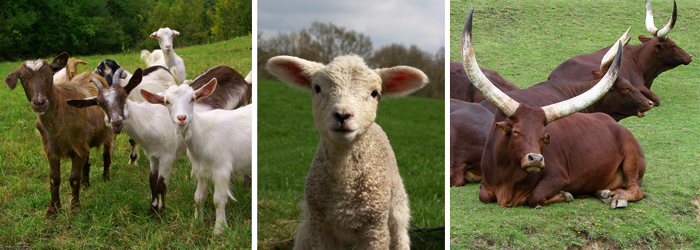
The offerings listed in the first three chapters of Leviticus attest to the abundance of Israel's livestock2. For example:
Speak to the children of Israel, and say to them: When any one of you brings an offering to Yahuwah, you shall bring your offering of the livestock--of the herd and of the flock. If his offering is a burnt sacrifice of the herd, let him offer a male without blemish; he shall offer it of his own free will at the door of the tabernacle of meeting before Yahuwah. (See Leviticus 1:2-3.3)
In addition to being able to eat the meat provided by their livestock, the children of Israel had oils and wheat flour with which to prepare meals. This is seen in Yahuwah's instructions for the consecration of the priests:
"And this is what you shall do to them to hallow them for ministering to Me as priests: Take one young bull and two rams without blemish, and unleavened bread, unleavened cakes mixed with oil, and unleavened wafers anointed with oil (you shall make them of wheat flour). . . . And Aaron and his sons you shall bring to the door of the tabernacle of meeting, and you shall wash them with water." (Exodus 29:1-4, NKJV)
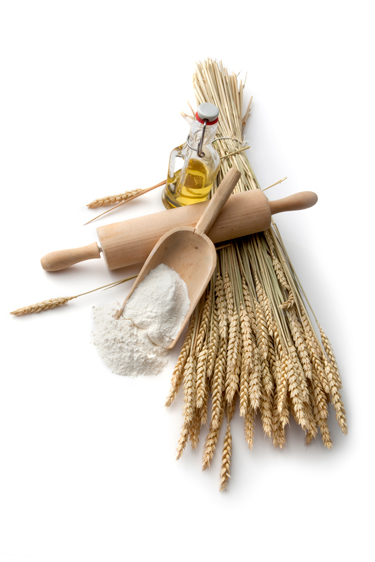 The fact that Israel was blessed with olive oil and flour during their stay in the wilderness can also be seen in Yahuwah's command regarding the tabernacle's lamps and the showbread that was to continually remain before Him.
The fact that Israel was blessed with olive oil and flour during their stay in the wilderness can also be seen in Yahuwah's command regarding the tabernacle's lamps and the showbread that was to continually remain before Him.
Then Yahuwah spoke to Moses, saying: "Command the children of Israel that they bring to you pure oil of pressed olives for the light, to make the lamps burn continually. . . . And you shall take fine flour and bake twelve cakes with it. Two-tenths of an ephah shall be in each cake. You shall set them in two rows, six in a row, on the pure gold table before Yahuwah. . . . And it shall be for Aaron and his sons, and they shall eat it in the holy place; for it is most holy to him from the offerings of Yahuwah made by fire, by a perpetual statute." (See Leviticus 24:1-9.)
Not only was Israel blessed with an abundance of livestock, oil, and flour with which to prepare meals, but they were also permitted to buy and trade as necessary with the various peoples that they providentially came into contact with. This is clearly seen in Yahuwah's command to Moses when the children of Israel were preparing to pass through Seir in the land of Esau.
And Yahuwah spoke to me, saying: "You have skirted this mountain long enough; turn northward. And command the people, saying, 'You are about to pass through the territory of your brethren, the descendants of Esau, who live in Seir; and they will be afraid of you. Therefore watch yourselves carefully. Do not meddle with them, for I will not give you any of their land, no, not so much as one footstep, because I have given Mount Seir to Esau as a possession. You shall buy food from them with money, that you may eat; and you shall also buy water from them with money, that you may drink. For Yahuwah, you Elohim, has blessed you in all the work of your hand. He knows your trudging through this great wilderness. These forty years Yahuwah, you Elohim, has been with you; you have lacked nothing.' " (See Deuteronomy 2:2-7.)
Many have mistakenly taken Israel's complaint about the manna in Numbers 11 to mean that they were only permitted to eat manna.
"Now the mixed multitude who were among them yielded to intense craving; so the children of Israel also wept again and said: 'Who will give us meat to eat? We remember the fish which we ate freely in Egypt, the cucumbers, the melons, the leeks, the onions, and the garlic; but now our whole being is dried up; there is nothing at all except this manna before our eyes!' " (Num 11:4-6, NKJV)
Israel's complaining that "there is nothing at all except this manna" was clearly an exaggeration and was a reflection of their lust for excessive flesh meats and the luxuries that many of them had enjoyed in Egypt. We must remember, here, that many Egyptians joined themselves with Israel during their exodus from the land of Egypt.
"Then the children of Israel journeyed from Rameses to Succoth, about six hundred thousand men on foot, besides children. A mixed multitude went up with them also, and flocks and herds--a great deal of livestock." (Exodus 12:37-38, NKJV)
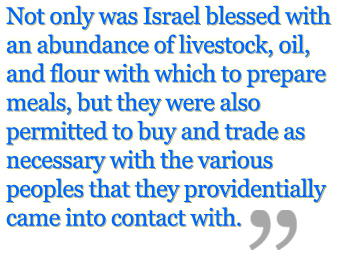 It was likely the Egyptians that joined themselves to Israel who were doing most of the complaining here, obstinately crying out for their former food staples.
It was likely the Egyptians that joined themselves to Israel who were doing most of the complaining here, obstinately crying out for their former food staples.
Manna was clearly not the only food available to Israel during their stay in the wilderness. This is further attested to by the fact that the manna was not even given until Israel's second month in the wilderness.
And they journeyed from Elim, and all the congregation of the children of Israel came to the Wilderness of Sin, which is between Elim and Sinai, on the fifteenth day of the second month after they departed from the land of Egypt. . . . And Yahuwah spoke to Moses, saying, "I have heard the complaints of the children of Israel. Speak to them, saying, 'At twilight you shall eat meat [quail], and in the morning you shall be filled with bread [manna]. And you shall know that I am Yahuwah your Elohim.' " (See Exodus 16:1, 11-12.)
What were the children of Israel eating during their first month in the wilderness? They were eating from their abundance of livestock, as well as from the provisions acquired when they plundered the Egyptians.
What, then, was the point of the manna if it was not to feed Israel? The primary purpose of the manna was to teach Israel the mechanics of Yahuwah's celestial calendar, which was established and ordained at Creation.
"And Elohim said, 'Let lights come to be in the expanse of the heavens to separate the day from the night, and let them be for signs and appointed times, and for days and years.' " (Genesis 1:14, ISR)
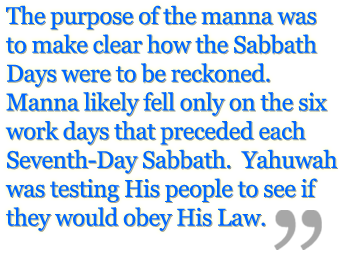 Manna likely did not fall on New Moon Days or on the 30th day of the month because it was not at all necessary. The children of Israel were blessed with an abundance of resources, and had plenty to eat, apart from the heavenly manna. This would explain why cooking was not forbidden on these days. The purpose of the manna was to make clear how the Sabbath Days were to be reckoned. Manna likely fell only on the six work days that preceded each Seventh-Day Sabbath. Yahuwah was testing His people to see if they would obey His Law.
Manna likely did not fall on New Moon Days or on the 30th day of the month because it was not at all necessary. The children of Israel were blessed with an abundance of resources, and had plenty to eat, apart from the heavenly manna. This would explain why cooking was not forbidden on these days. The purpose of the manna was to make clear how the Sabbath Days were to be reckoned. Manna likely fell only on the six work days that preceded each Seventh-Day Sabbath. Yahuwah was testing His people to see if they would obey His Law.
Then Yahuwah said to Moses, "Behold, I will rain bread from heaven for you. And the people shall go out and gather a certain quota every day, that I may test them, whether they will walk in My law or not. And it shall be on the sixth day that they shall prepare what they bring in, and it shall be twice as much as they gather daily." (See Exodus 16:4-5.)
Yahuwah, in His great mercy and infinite wisdom, was teaching Israel what they had spent 400 years forgetting, His calendar! Today, our loving Father is again restoring His calendar. He is testing those who profess to belong to Him to see if they will walk in His Law. Will you, today, join yourself to Yahuwah's faithful? Will you pledge your allegiance to Yahuwah, and commit to observing the holy days on His appointed calendar?
For He is our Elohim, and we are the people of His pasture, and the sheep of His hand. Today if you will hear His voice, harden not your heart, as in the day of strife, as in the day of testing in the wilderness. (See Psalms 95:7-8.)
The choice is yours...
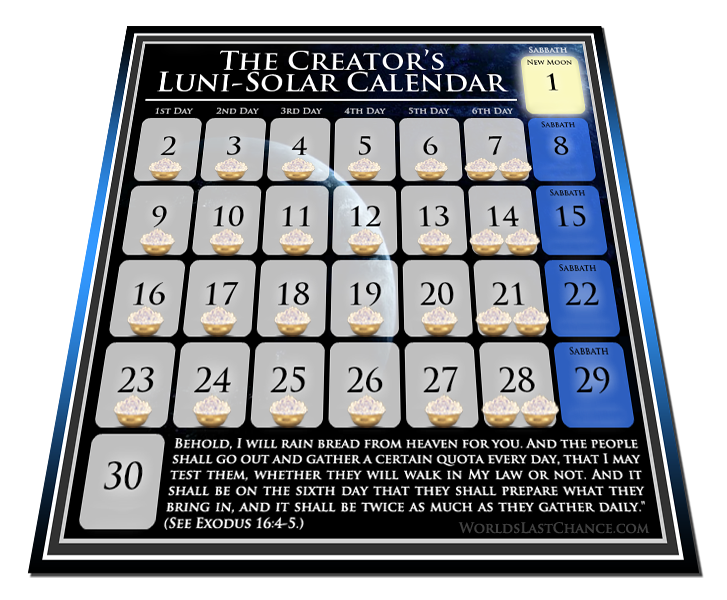
1 It is worth noting that Scripture does not provide details about how manna would relate to Feast Days, either. For example, there is no mention of whether or not the manna would fall on the Day of Atonement, which was to be a solemn day of fasting and no labor (Leviticus 23:27-32). This, however, does not prove that the Day of Atonement was not part of the Hebrew calendar!
2 Even considering the vast amount of required sacrifices and the regular consumption of the livestock by the children of Israel, it is likely that the number of livestock increased exponentially (as they had offspring) during Israel's stay in the wilderness.
3 See also Numbers, Chapters 28 & 29, for an extensive list of the prescribed sacrifices and offerings.







